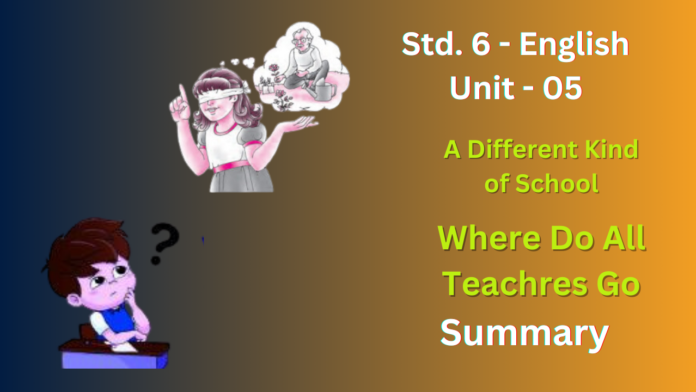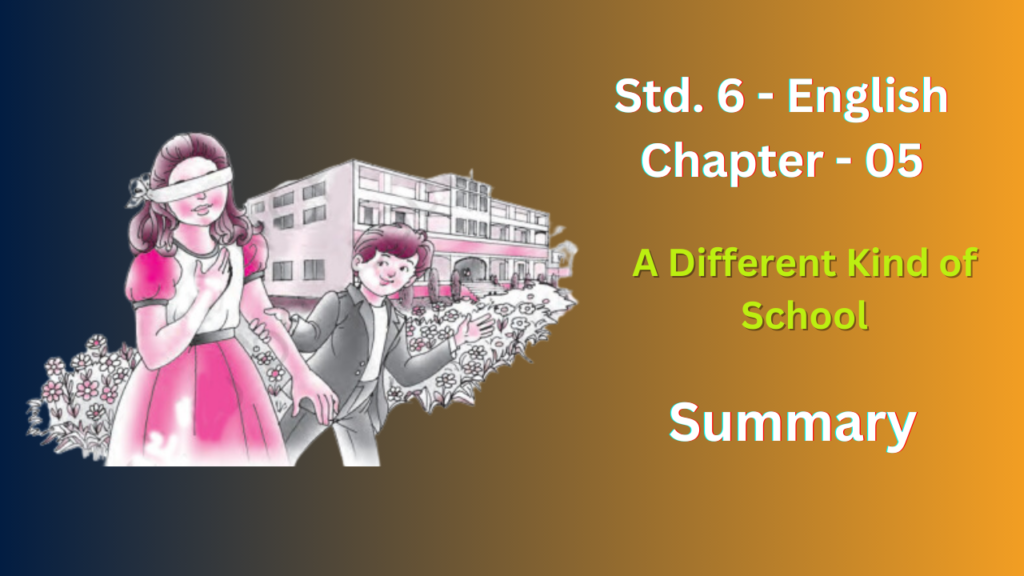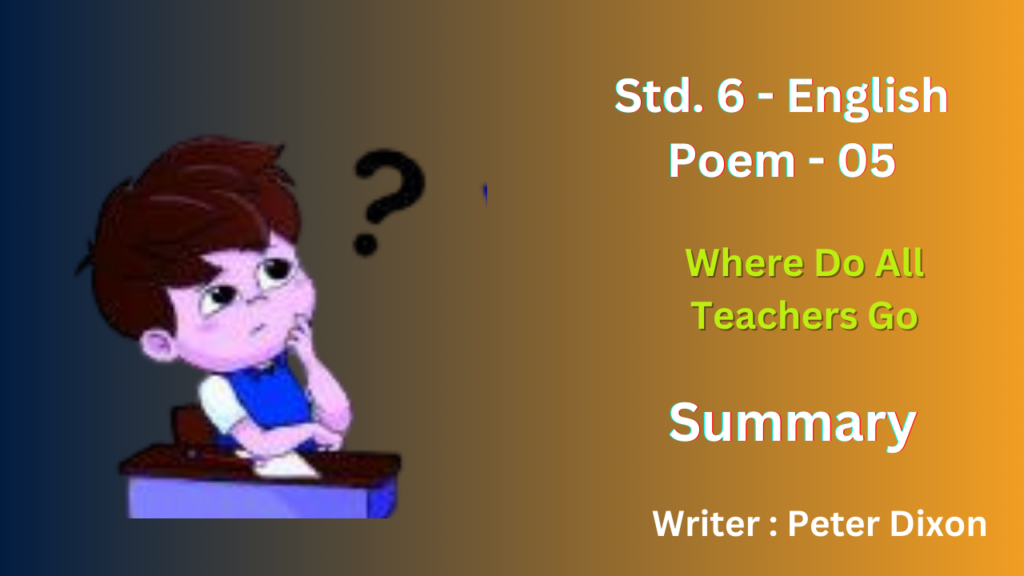
NCERT Solutions for Class 6th English Chapter 5: A Different Kind of School & Where do all Teachers go
A Different Kind of School
Setting the Scene:
- The story begins with the narrator feeling disgruntled after a bad day. His leg is in a cast, and he’s generally grumpy.
- He hears about a unique school run by Miss Beam and decides to visit, hoping for a distraction.
Meeting Miss Beam:
- Upon arrival, the narrator describes Miss Beam as someone who exudes authority but is also kind and understanding.
- He inquires about the school’s teaching methods, which he learns are focused on practical applications rather than rote memorization.
Learning Through Experience:
- Miss Beam emphasizes teaching “thoughtfulness” and raising “responsible citizens.”
- The narrator observes the school environment and notices well-behaved children engaged in various activities.
A Glimpse into the Classroom:
- Looking out the window, the narrator sees a beautiful garden and playground where children play.
- He observes some students with disabilities – one with limited vision, another with a crutch – but they appear happy and included.
A Lesson in Honesty:
- The narrator witnesses a situation where a girl accidentally breaks something and tries to blame another child.
- Miss Beam uses this as a teachable moment, discussing the importance of honesty and taking responsibility for actions.
A Shift in Perspective:
- The narrator is surprised by the children’s behavior. They are well-mannered, display empathy for their classmates, and demonstrate a sense of accountability.
- This experience challenges the narrator’s own preconceptions about education and makes him reflect on his initial negativity.
Leaving with a New Lens:
- The narrator departs with a newfound appreciation for Miss Beam’s approach. He realizes that education should not just focus on acquiring knowledge but also on nurturing good character.
- The story ends with the narrator vowing to be more thoughtful about his own actions, highlighting the lasting impact of the visit.

NCERT Solutions for Class 6th English Chapter 5:A Different Kind of School
Working With a Text
A. Put these sentences from the story in the right order and write them out in a paragraph. Don’t refer to the text.
- I shall be so glad when today is over.
- Having a leg tied up and hopping about on a crutch is almost fun, I guess.
- I don’t think I’ll mind being deaf for a day—at least not much.
- But being blind is so frightening.
- Only you must tell me about things.
- Let’s go for a little walk.
- The other bad days can’t be half as bad as this.
Ans : I don’t think I’ll mind being deaf for a day—at least not much. Having a leg tied up and hopping about on a crutch is almost fun, I guess. But being blind is so frightening. Only you must tell me about things. Let’s go for a little walk. I shall be so glad when today is over.
B. Answer the following questions:
1. Why do you think the writer visited Miss Beam’s school?
Ans :
1. Curiosity and Seeking a Distraction:
- The story often starts with the writer having a bad day and feeling grumpy due to his injured leg.
- He might have heard about Miss Beam’s unique school and decided to visit out of curiosity to see something different.
- The school could be a welcome distraction from his own troubles.
2. Interest in Miss Beam’s Teaching Methods:
- The writer might have specifically heard about Miss Beam’s innovative approach to education, emphasizing practical experiences and character development.
- He could be interested in learning more about her methods and seeing them in action.
2. What was the ‘game’ that every child in the school had to play?
Ans :
- Blind day
- Lame day
- Deaf day
- Injured day
- Dumb day
3. “Each term every child has one blind day, one lame day …”. Complete the line. Which day was the hardest? Why was it the hardest?
Ans : Each term every child has one blind day, one lame day, one deaf day, one injured day, and one dumb day.
The dumb day might be the most challenging.
Why the Dumb Day Might Be Hardest:
- Restricted Communication: The inability to speak would significantly limit a child’s ability to express themselves and interact with others.
- Frustration and Dependence: They would likely experience frustration at not being able to communicate their thoughts and ideas freely.
- Test of Willpower: The text might mention that the children couldn’t use gestures or sign language on a dumb day, making it even harder. This would require them to rely solely on their willpower to remain silent, which could be particularly difficult for a child.
4. What was the purpose of these special days?
Ans : The special days in Miss Beam’s school are designed to build empathy and understanding by letting kids experience limitations like blindness or deafness firsthand.
Working With Language
A. Match the words and phrases with their meanings in the box below.
- Homesick
- Practically
- It pains me
- Appreciate
- Thoughtless
- Exercise
- Relief
- Ghastly
[ almost, it hurts me, terrible test the strength of, understanding the difficulties, wanting to be home, a welcome change, not very caring ]
Ans :
| Column I | Column II |
| Homesick | Wanting to be home |
| Practically | Almost |
| It pains me | It hurts me |
| Appreciate | Understanding the difficulties |
| Thoughtless | Not very caring |
| Excercise | Test the strength of |
| Relief | A welcome change |
| Ghastly | Terrible |
B. Re-word these lines from the story:
1. I had heard a great deal about Miss Beam’s school.
2. Miss Beam was all that I had expected – middle-aged, full of authority.
3. I went to the window which overlooked a large garden.
4.“We cannot bandage the children’s mouths, so they really have to exercise their will-power
Ans :
- Miss Beam’s school had been the subject of many conversations I’d overheard.
- Miss Beam embodied my expectations perfectly. She was middle-aged and commanded respect.
- I approached a window that offered a view of a sprawling garden.
- Since we can’t gag the children,” Miss Beam said, “they must rely on immense self-control.
C. Given below is a page from a dictionary. Look at it carefully and
1. Find a word which means the same as ghastly. Write down the word and its two meaning.
2. Find a word meaning a part of the school year.
3. Find a word that means examination
Ans :
- Macabre
- Term
- Test
Poem – Where Do All Teachers Go
NCERT Solutions for Class 6th English Chapter 5:Where do all Teachers go
The poem “Where Do All The Teachers Go?” by Peter Dixon explores the innocence and curiosity of a young child towards their teachers. Here’s a summary:
Curiosity and Imagination:
- The poem starts with a child’s wonder about their teachers’ lives outside of school.
- When the school bell rings at “four o’clock” (possibly signifying the end of the school day), the child ponders where their teachers disappear to.
Questioning the Mundane:
- The child imagines their teachers doing ordinary things they themselves experience, questioning if teachers:
- Wash their socks
- Wear pajamas
- Watch television
- Pick their noses (considered a childish act)
- Make mistakes and get punished
- Lose things like books
- Scribble on desks
- Wear old, dirty clothes
Beyond the Classroom:
- The underlying question is whether teachers are human beings with normal lives beyond their role in the classroom.
- The child struggles to comprehend that their seemingly all-knowing and powerful teachers might also engage in these seemingly mundane activities.
The Beauty of Innocence:
- The charm of the poem lies in the child’s innocent perspective. They haven’t yet grasped the concept of adults having lives separate from their professional roles.
- This curiosity lays the foundation for a healthy respect for teachers while acknowledging their humanity.
Themes:
- Childhood Innocence: The poem captures the inquisitive and imaginative nature of children as they try to understand the world around them.
- Teacher-Student Relationship: It highlights the child’s respect for their teachers and their desire to learn more about them on a personal level.
- Blurring Boundaries: The poem subtly explores the blurring of lines between authority figures and individuals, fostering a sense of understanding and connection.

NCERT Solutions for Class 6th English Chapter 5 Poem :Where do all Teachers go
Working with the poem
1. Answer these questions.
(i) Why does the poet want to know where the teachers go at four o’clock?
Ans : The poet, a child, wants to know where the teachers go at four o’clock because they’re curious about their teachers’ lives beyond school. They wonder what these seemingly perfect figures do and where they go, questioning if they’re even human!
(ii) What are the things normal people do that the poet talks about?
Ans :
- Washing socks: This is a mundane household chore, suggesting the child wonders if even their seemingly perfect teachers have to do laundry.
- Wearing pajamas: Pajamas are associated with relaxation and informality. The child ponders if teachers shed their authoritative image at home and wear comfortable clothes.
- Watching television: This is a leisure activity, making the child wonder if teachers unwind and enjoy some screen time after school.
- Picking their noses (considered a childish act): This is a behavior typically associated with children, and the child ponders if even their teachers might do something considered slightly naughty in private.
- Making mistakes and getting punished: This challenges the child’s image of teachers as infallible. They wonder if teachers ever make mistakes and face consequences, similar to students.
- Losing things like books: Losing things is a common human experience, and the child ponders if even their seemingly organized teachers might misplace belongings.
- Scribbling on desks: This is a mischievous act often associated with students. The child questions if teachers ever did something similar, perhaps as students themselves.
- Wearing old, dirty clothes: This is in contrast to the teacher’s attire at school. The child wonders if, outside the classroom, teachers wear less formal and possibly well-worn clothes.
(iii) What does he imagine about
(a) where teachers live?
(b) what they do at home?
(c) the people with whom they live?
(d) their activities when they were children in school?
Ans :
- In house
- Watching television, wearing pajamas ,Washing socks, Watching TV,
- With family
- Child might be pondering if even their teachers engaged in similar “naughty” behaviors when they were students themselves.
(iv) Why does the poet wonder if teachers also do things that other people do?
Ans : The poet wonders if teachers do normal things because they want to know if these seemingly perfect, all-knowing teachers are also regular people who wear pajamas, watch TV, and make mistakes – bridging the gap between respect and human connection.
(v) How does the poet plan to find out? What will he do once he finds out?
Аns : The poem remains silent on the child’s concrete plan to discover the teachers’ lives. Maybe they’d follow them (not very practical!) or inquire from an adult. The focus isn’t on the “how” but on the “why.” The child’s wonder seeks to bridge the gap between respect for teachers and the desire to see them as ordinary people.
Question 2.
What do you think these phrases from the poem mean?
- punished in the corner.
- leave their greens.
Ans : In the poem, “punished in the corner” reflects the child’s view of teachers as disciplinary figures, while “leave their greens” suggests the child’s attempt to find common ground with teachers, even in something as simple as disliking vegetables.
FAQ’S
In A Different Kind of School chapter What information did Miss Beam share with the author regarding the children in the playground?
Miss Beam informed the author that the children in the playground were not playing; instead, they were engaging in various activities such as “secret meetings,” “scientific exploration,” and “great flights.
What is the significance of “A Different Kind of School” in NCERT Solutions for Class 6th English Chapter 5?
A Different Kind of School” presents a unique approach to education, emphasizing creativity, self-expression, and hands-on learning experiences, making it an essential component of the Class 6 English curriculum.
How do “A Different Kind of School” and “Where do all Teachers Go” contribute to the overall objectives of the Class 6 English curriculum?
These texts provide students with alternative perspectives on education, encouraging critical thinking and reflection on traditional schooling methods, while also highlighting the value of imagination and curiosity in the learning process.
What are the key themes explored in “A Different Kind of School” and “Where do all Teachers Go”?
Both “A Different Kind of School” and “Where do all Teachers Go” explore themes such as the importance of unconventional education, the role of imagination and creativity in learning, and the significance of teachers in shaping young minds.
How do “A Different Kind of School” and “Where do all Teachers Go” inspire students to become active participants in their own learning?
These texts empower students to take ownership of their education by fostering a sense of curiosity, self-expression, and personal responsibility for their learning outcomes.

